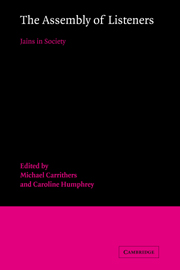Book contents
- Frontmatter
- Contents
- List of illustrations
- List of contributors
- Acknowledgements
- Map: South Asia
- Introduction
- 1 Jains as a community: a position paper
- 1 JAIN IDEALS AND JAIN IDENTITY
- 2 LOCAL JAIN COMMUNITIES
- 6 Local Jain communities
- 7 The Jain merchant castes of Rajasthan: some aspects of the management of social identity in a market town
- 8 Jain shopkeepers and moneylenders: rural informal credit networks in south Rajasthan
- 9 A study of Jains in a Rajasthan town
- 3 JAINS IN THE INDIAN WORLD
- 4 NEW JAIN INSTITUTIONS IN INDIA AND BEYOND
- Conclusion
- Glossary and pronunciation
- Select bibliography
- Index
8 - Jain shopkeepers and moneylenders: rural informal credit networks in south Rajasthan
Published online by Cambridge University Press: 07 October 2011
- Frontmatter
- Contents
- List of illustrations
- List of contributors
- Acknowledgements
- Map: South Asia
- Introduction
- 1 Jains as a community: a position paper
- 1 JAIN IDEALS AND JAIN IDENTITY
- 2 LOCAL JAIN COMMUNITIES
- 6 Local Jain communities
- 7 The Jain merchant castes of Rajasthan: some aspects of the management of social identity in a market town
- 8 Jain shopkeepers and moneylenders: rural informal credit networks in south Rajasthan
- 9 A study of Jains in a Rajasthan town
- 3 JAINS IN THE INDIAN WORLD
- 4 NEW JAIN INSTITUTIONS IN INDIA AND BEYOND
- Conclusion
- Glossary and pronunciation
- Select bibliography
- Index
Summary
The typical Marwari moneylender was not by nature a landowner, his Jain faith and distinct life style marking him out as an alien who was as unassimilable outside his own profession as the medieval Jew.
Eric Stokes, The Peasant and the Raj. Studies in Agrarian Society and Peasant Rebellion in Colonial India (Cambridge University Press, 1978)Introduction
The supply of informal credit is recognised to be an extremely important component of overall credit provision in India. Habib (1964) in his analysis of usury in the medieval Indian economy demonstrates the long history of moneylending in the sub-continent. Numerous studies (e.g. Bailey 1964; Desai 1979; Michie 1978; Timberg and Aiyar 1984) show the continued importance of such moneylending practices in both the rural and urban areas of India. However, it is also recognised that there is little precise data to give us an accurate economic account of the extent and operations of the informal credit markets.
A similar situation exists with regard to Jain studies. The Jains are rightly regarded as an important and very influential merchant community in India. However, apart from rather general studies of Jain ethics and business practices we have no detailed economic accounts of their business and commercial activities. Furthermore, this paucity of economic information is particularly pronounced with respect to the many Jain communities in the rural areas of India. Carrithers and Humphrey (this volume) have identified five criteria by which they feel the Jains may be described as a community.
- Type
- Chapter
- Information
- The Assembly of ListenersJains in Society, pp. 109 - 138Publisher: Cambridge University PressPrint publication year: 1991
- 3
- Cited by



